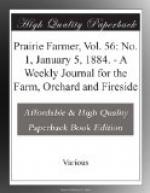The text will be found in Leviticus 16: 21-22-23; but whether its application can be found is uncertain. Horticulturists are prone to find scape-goats to carry their sins of omission and commission; and they load these—a great burden—upon them, and send them off to be lost in the wilderness. Providence is most usually chosen by them for this purpose. Most of their mistakes and failures—sins, let us call them—are ascribed to Providence; and He is expected to carry the burden. But I strongly urge they remain our own after all.
I am led to these conclusions by the fact that among the many failures in fruit culture there are some splendid successes; and that these successes occur with those, as a rule, who are guiltless of these sins; and that just in proportion to the magnitude of the guilt is the success insured. In other words—that almost invariably are our failures to be attributed to our own want of skill and our neglect—most generally the latter. Here and there we note cases of marked success—of heavy crops and large returns for care and labor invested. These are mostly on a small scale; as for instance, one man produces from at the rate of 200 to 300 bushels of strawberries per acre, on a few rods of ground. Another, his neighbor, gets about as many quarts. The conditions of soil and climate are about the same. Now is Providence to be charged with this disparity? Certainly not. The same care, the same intelligent management, and the same amount of labor bestowed, would have produced as favorable results in the one case as in the other.
And so, as to larger tracts. I hold that what my neighbor can do on a dozen square rods, he and I both ought to be equally able to do on five or ten, or twenty times as large a tract. But, you say, these large yields are the results of extraordinary care. True, they are; and that proves my theory—that extraordinary care will produce extraordinary results. What one man can do once, he can do again and all the time; and we all can do the same. Extraordinary care may be defined as the care necessary to produce good results, and if that care were always applied it would cease to be extraordinary.
I myself saw in my neighbor’s field a crop of strawberries, on two rows, which at the safest and closest calculation I could make, yielded at the rate of over 300 bushels per acre. He had but the two rows; had given them extraordinary care—had kept them clear of grass and weeds—and the ground mellow—and had mulched them with forest leaves. Those two rows were in a field of several acres in size. The same care in planting, in cultivating, in mulching, and the whole tract would have produced corresponding results. That same year, my crop, on soil equally as good, reached a yield of less than one-fifth in amount. Why this difference? Providence favored him and didn’t favor me, I might say, if I felt disposed to make a scape-goat of Providence for my misdeeds. But




